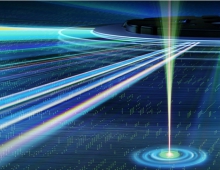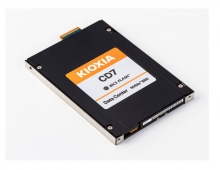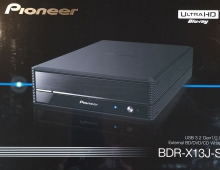
HP strikes Blu note for DVDs, talks of fat storage
PC buyers can look forward to DVDs with up to 10 times the storage they now have when Hewlett-Packard rolls out machines supporting next-generation DVD technology next year.
The PC maker announced on Tuesday that it will support the Blu-ray Disc format in some desktops and notebooks in late 2005. HP is one of the first companies to announce the inclusion of Blu-ray Disc, a blue-laser technology that enables storage of up to 50GB on a dual-layer disc.
Drives supporting the format are expected to play CDs and DVDs.
Blu-ray Disc is competing with another blue-laser technology, high-definition DVDs, but the two formats are incompatible. HD DVD discs store up to 30GB on a dual-layer disc. Blue-laser optical disc formats are expected to take over for DVDs, which--with a storage capacity of 4.7GB--won't be able to store much high-resolution digital television programming.
"Our decision to back Blu-ray was largely because of its capacity advantage (over HD DVD), as well as the interactive features being built into the specification," said Maureen Weber, general manager of optical storage at HP. "We will help with economies of scale....We'll drive down prices as we push volumes."
Pushing products based on Blu-ray to market is a priority for HP, Weber added.
HP's involvement with Blu-ray recalls the rewritable DVD format battles in which PC makers HP and Dell helped swing momentum toward the DVD+RW format.
HP and Dell are members of the Blu-ray Disc Association (formerly the Blu-ray Disc Founders group), which promotes and develops the Blu-ray Disc format. The group has about 88 members, including Hitachi, LG Electronics, Matsushita Electric Industrial, Pioneer, Royal Philips Electronics, Samsung Electronics, Sharp, Sony and Thomson Multimedia.
Companies promoting the HD DVD format include Memory-Tech, NEC, Sanyo Electric and Toshiba.
HP's support is not a surprise, but it is sign of commitment from a PC maker for Blu-ray Disc.
Toshiba said it plans to introduce notebooks with HD DVD in December of 2005.
HP will introduce Blu-ray Disc drives in late 2005 as well, starting in its media center PCs, desktops and personal workstations and followed by notebooks in early 2006. HP will support Blu-ray read-only, rewritable and recordable discs.
Drives supporting the format are expected to play CDs and DVDs.
Blu-ray Disc is competing with another blue-laser technology, high-definition DVDs, but the two formats are incompatible. HD DVD discs store up to 30GB on a dual-layer disc. Blue-laser optical disc formats are expected to take over for DVDs, which--with a storage capacity of 4.7GB--won't be able to store much high-resolution digital television programming.
"Our decision to back Blu-ray was largely because of its capacity advantage (over HD DVD), as well as the interactive features being built into the specification," said Maureen Weber, general manager of optical storage at HP. "We will help with economies of scale....We'll drive down prices as we push volumes."
Pushing products based on Blu-ray to market is a priority for HP, Weber added.
HP's involvement with Blu-ray recalls the rewritable DVD format battles in which PC makers HP and Dell helped swing momentum toward the DVD+RW format.
HP and Dell are members of the Blu-ray Disc Association (formerly the Blu-ray Disc Founders group), which promotes and develops the Blu-ray Disc format. The group has about 88 members, including Hitachi, LG Electronics, Matsushita Electric Industrial, Pioneer, Royal Philips Electronics, Samsung Electronics, Sharp, Sony and Thomson Multimedia.
Companies promoting the HD DVD format include Memory-Tech, NEC, Sanyo Electric and Toshiba.
HP's support is not a surprise, but it is sign of commitment from a PC maker for Blu-ray Disc.
Toshiba said it plans to introduce notebooks with HD DVD in December of 2005.
HP will introduce Blu-ray Disc drives in late 2005 as well, starting in its media center PCs, desktops and personal workstations and followed by notebooks in early 2006. HP will support Blu-ray read-only, rewritable and recordable discs.





















